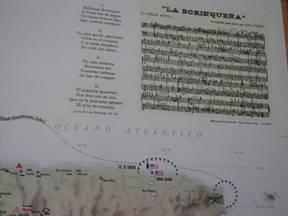
From time to time, when a Puerto Rican pro-independent visits Cuba, they will bring up in the corresponding discourses, that image by the Puerto Rican poetess Lola Rodriguez the two wings of a bird and the approach of Jose Marti, the first fight for the independence of Cuba and later for that of Puerto Rico, valid in the 19th century when both territories were Spanish colonies, but subsequently obsolete with the development of historical events, where Cuba obtained its independence and Puerto Rico became an “Associated Free State” of the United States (or the Commonwealth of Puerto Rico, its official name in English).
In the 19th century, apart from its solidarity content, the Martian approach also had an eminently practical objective: to get the Puerto Rican residents in the Union, principally en Key West and Tampa (who were numerous) to help the Cuban cause economically with the commitment of doing the same for them once Cuban independence was achieved. Since then it has rained here a lot.
Today this approach, if one tried to put it into practice, would be considered an interference in internal matters by another state and would receive little support from international agencies. It is logical, no one has the right to decide about a foreign country.
According to the information I have (here these data are not published), Puerto Ricans mostly are in agreement with their status with the United States: in the last referendum held on the topic, some 48% (close to three thousand pro-independents, who voted at the last minute to prevent the country from becoming part of the United States as its 52nd state) were in agreement with keeping the current status of Associated Free State, 48% voted to join the US as a state and only 4% voted for independence. To summarize: 96% agree with the status (in one form or another) and only 4% do not. When they have taken later surveys among the population, 90% are in agreement with the current status and only 10% are not.
The reasons are understandable: the country has never had dictators, nor fratricidal fights, having enjoyed for decades a tranquil social climate and economic development. Besides keeping its flag, anthem and language (Spanish is mostly spoken but also English), its customs, culture, etc., and sharing also those of North America, they possess the same rights as North Americans because they have had US nationality since 1917, including the passport; they can live on the island or in any state of the Union, enjoying a first class health and education system, as well as Social Security.
That’s why, when some clueless person presents in the United Nations the topic of the decolonization of Puerto Rico, many look surprised and ask: How to decolonize someone who does not want to be decolonized, because they do not feel that way? Absurdities of some countries’ foreign policy, where ideology prevails instead of reason. Puerto Ricans of all political stripes have demonstrated that, respecting each other,people can live in peace and successfully develop a country achieving well-being for the majority without social upheavals or violent acts. They make a good example to follow. In November this year they will realize a new referendum to determine democratically what political relationship with the United States their inhabitants wish. Let’s await the results!
Translated by mlk
July 8 2012
